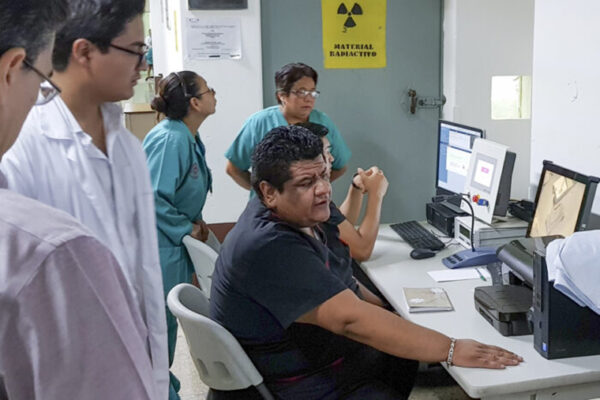Modernizing radiation therapy in Guatemala
With the help of a grant from the U.S. Agency for International Development, an international team that includes scientists from the School of Medicine is poised to improve cancer care in Guatemala with new state-of-the-art radiation therapy equipment.
Effort to improve radiation therapy for veterans receives nearly $4 million
In a national effort to improve and standardize radiation therapy for U.S. veterans with cancer, the Veterans Health Administration (VHA) has contracted with Washington University School of Medicine in St. Louis for an additional $3.8 million to fund the project.
Siteman Cancer Center treats first patients using MRI-guided radiation therapy
In a world’s first, physicians at Siteman Cancer Center have begun treating patients using MRI-guided radiation therapy, a technology that allows tumors to be visualized during treatment. Shown is Wayne Kestler, 80, one of the first patients treated with the new technology.
Probiotic protects intestine from radiation injury
Scientists at Washington University School of Medicine in St. Louis have shown that taking a probiotic before radiation therapy can protect the intestine from damage — at least in mice. Their study suggests that taking a probiotic also may help cancer patients avoid intestinal injury, a common problem in those receiving radiation therapy for abdominal cancers.
Measuring lung motion leads to better radiation treatment for lung cancer
Parag Parikh and Kristen Lechleiter set up the 4D Phantom to simulate the motion of tumors in the lung.Tumors that move, such as those in the lung — which can change position during each breath — are a special problem for radiation oncologists. A group at Washington University School of Medicine in St. Louis has studied the way lung tissues move during breathing in hopes of improving radiation as a treatment for lung cancer.
Measuring lung motion leads to better radiation treatment for lung cancer
Parag Parikh and Kristen Lechleiter set up the 4D Phantom to simulate the motion of tumors in the lung.Tumors that move, such as those in the lung — which can change position during each breath — are a special problem for radiation oncologists. A group at Washington University School of Medicine in St. Louis has studied the way lung tissues move during breathing in hopes of improving radiation as a treatment for lung cancer. More…
Avoiding esophagitis
Lung cancer tumor to be treated with radiation.More than half of the lung cancer patients who receive radiation treatment for their illness develop a painful swelling and inflammation in the esophagus known as esophagitis. Although treating the lung cancer is the top priority for doctors, researchers at Washington University School of Medicine in St. Louis hope to lower the risk of this unpleasant side effect. They have quantified risk factors for esophagitis, linking it to the amount of radiation a patient’s esophagus receives and to simultaneous chemotherapy. The findings mean it may be possible to predict and potentially avoid esophagitis, according to Jeffrey D. Bradley, M.D., assistant professor of radiation oncology and lead author of a paper published recently in the International Journal of Radiation Oncology, Biology, Physics.


